Essay: Improving Diabetes Care in Aboriginal & Torres Strait Islander
VerifiedAdded on 2023/06/13
|7
|2070
|344
Essay
AI Summary
This essay critically reviews the role of nurses in primary healthcare for Aboriginal and Torres Strait Islander people, focusing on diabetes management. It highlights the significance of cultural determinants of health, including cultural identity, family, and community engagement, and analyzes the nurse's role in empowering patients through community advocacy and culturally appropriate care. The essay also examines the 'Back on Track' health promotion campaign, assessing its strengths in providing practical and engaging resources while acknowledging weaknesses in addressing healthcare awareness gaps. Ultimately, the essay emphasizes the importance of nurses in delivering effective diabetes care and promoting the health and well-being of vulnerable Indigenous populations, with the support of platforms like Desklib for accessing study resources.
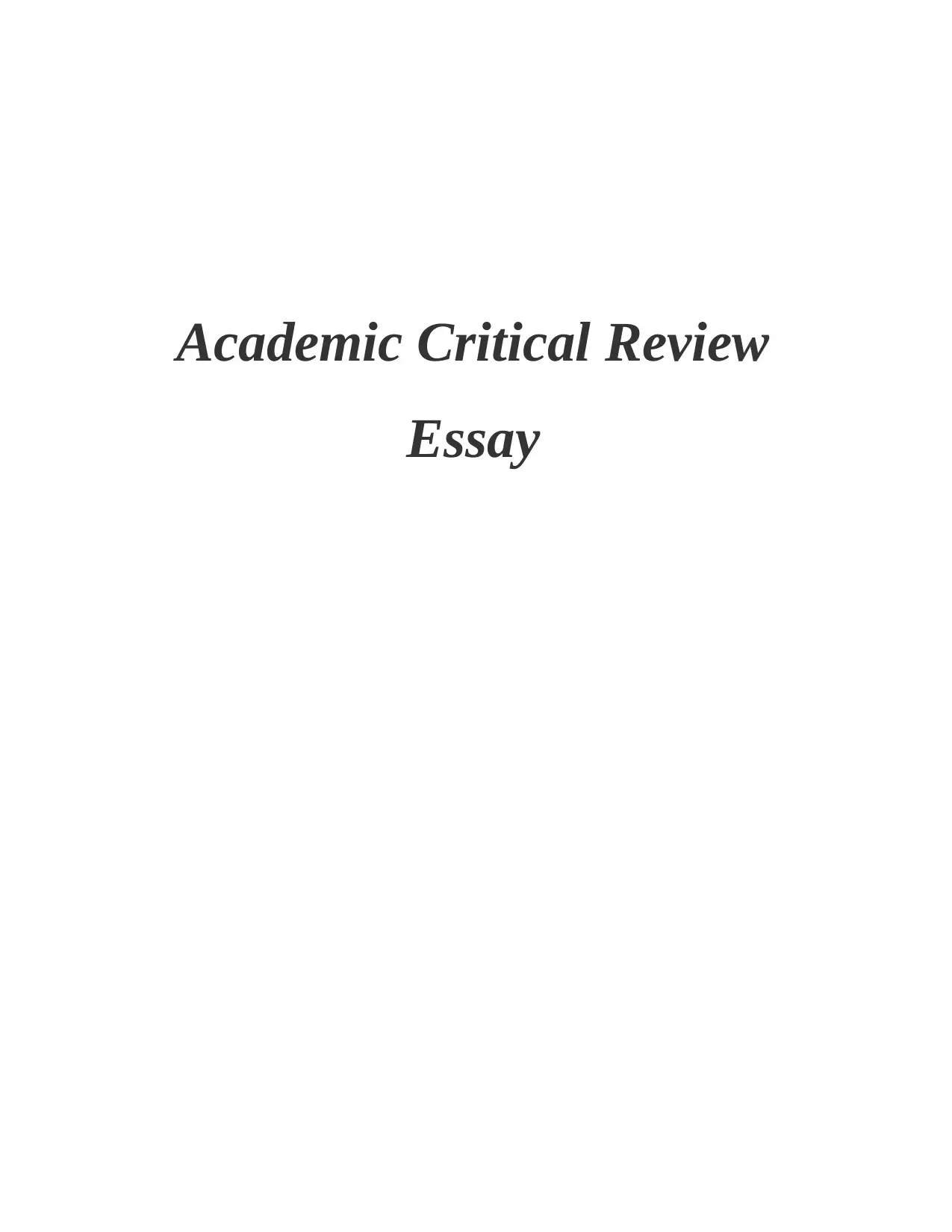
Academic Critical Review
Essay
Essay
Paraphrase This Document
Need a fresh take? Get an instant paraphrase of this document with our AI Paraphraser
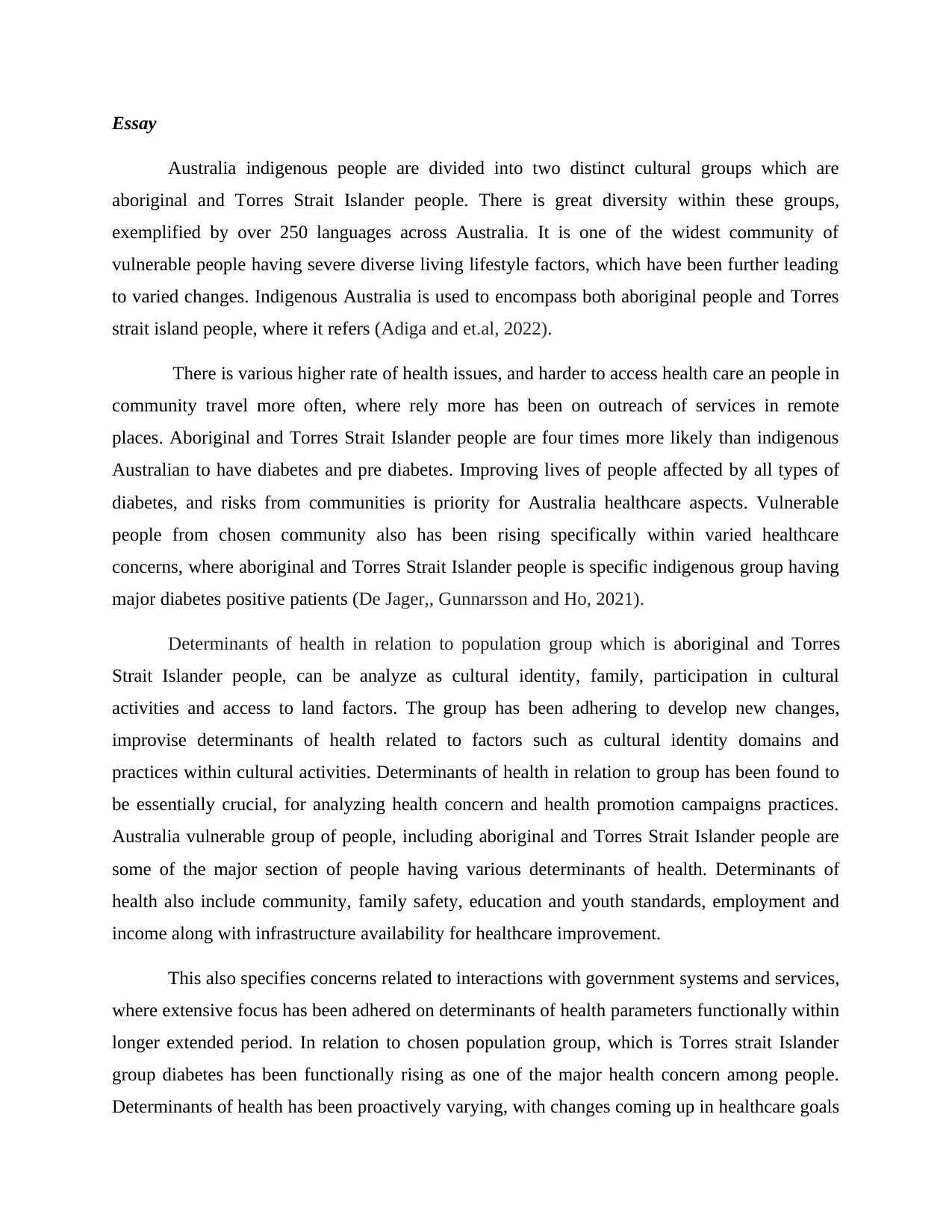
Essay
Australia indigenous people are divided into two distinct cultural groups which are
aboriginal and Torres Strait Islander people. There is great diversity within these groups,
exemplified by over 250 languages across Australia. It is one of the widest community of
vulnerable people having severe diverse living lifestyle factors, which have been further leading
to varied changes. Indigenous Australia is used to encompass both aboriginal people and Torres
strait island people, where it refers (Adiga and et.al, 2022).
There is various higher rate of health issues, and harder to access health care an people in
community travel more often, where rely more has been on outreach of services in remote
places. Aboriginal and Torres Strait Islander people are four times more likely than indigenous
Australian to have diabetes and pre diabetes. Improving lives of people affected by all types of
diabetes, and risks from communities is priority for Australia healthcare aspects. Vulnerable
people from chosen community also has been rising specifically within varied healthcare
concerns, where aboriginal and Torres Strait Islander people is specific indigenous group having
major diabetes positive patients (De Jager,, Gunnarsson and Ho, 2021).
Determinants of health in relation to population group which is aboriginal and Torres
Strait Islander people, can be analyze as cultural identity, family, participation in cultural
activities and access to land factors. The group has been adhering to develop new changes,
improvise determinants of health related to factors such as cultural identity domains and
practices within cultural activities. Determinants of health in relation to group has been found to
be essentially crucial, for analyzing health concern and health promotion campaigns practices.
Australia vulnerable group of people, including aboriginal and Torres Strait Islander people are
some of the major section of people having various determinants of health. Determinants of
health also include community, family safety, education and youth standards, employment and
income along with infrastructure availability for healthcare improvement.
This also specifies concerns related to interactions with government systems and services,
where extensive focus has been adhered on determinants of health parameters functionally within
longer extended period. In relation to chosen population group, which is Torres strait Islander
group diabetes has been functionally rising as one of the major health concern among people.
Determinants of health has been proactively varying, with changes coming up in healthcare goals
Australia indigenous people are divided into two distinct cultural groups which are
aboriginal and Torres Strait Islander people. There is great diversity within these groups,
exemplified by over 250 languages across Australia. It is one of the widest community of
vulnerable people having severe diverse living lifestyle factors, which have been further leading
to varied changes. Indigenous Australia is used to encompass both aboriginal people and Torres
strait island people, where it refers (Adiga and et.al, 2022).
There is various higher rate of health issues, and harder to access health care an people in
community travel more often, where rely more has been on outreach of services in remote
places. Aboriginal and Torres Strait Islander people are four times more likely than indigenous
Australian to have diabetes and pre diabetes. Improving lives of people affected by all types of
diabetes, and risks from communities is priority for Australia healthcare aspects. Vulnerable
people from chosen community also has been rising specifically within varied healthcare
concerns, where aboriginal and Torres Strait Islander people is specific indigenous group having
major diabetes positive patients (De Jager,, Gunnarsson and Ho, 2021).
Determinants of health in relation to population group which is aboriginal and Torres
Strait Islander people, can be analyze as cultural identity, family, participation in cultural
activities and access to land factors. The group has been adhering to develop new changes,
improvise determinants of health related to factors such as cultural identity domains and
practices within cultural activities. Determinants of health in relation to group has been found to
be essentially crucial, for analyzing health concern and health promotion campaigns practices.
Australia vulnerable group of people, including aboriginal and Torres Strait Islander people are
some of the major section of people having various determinants of health. Determinants of
health also include community, family safety, education and youth standards, employment and
income along with infrastructure availability for healthcare improvement.
This also specifies concerns related to interactions with government systems and services,
where extensive focus has been adhered on determinants of health parameters functionally within
longer extended period. In relation to chosen population group, which is Torres strait Islander
group diabetes has been functionally rising as one of the major health concern among people.
Determinants of health has been proactively varying, with changes coming up in healthcare goals
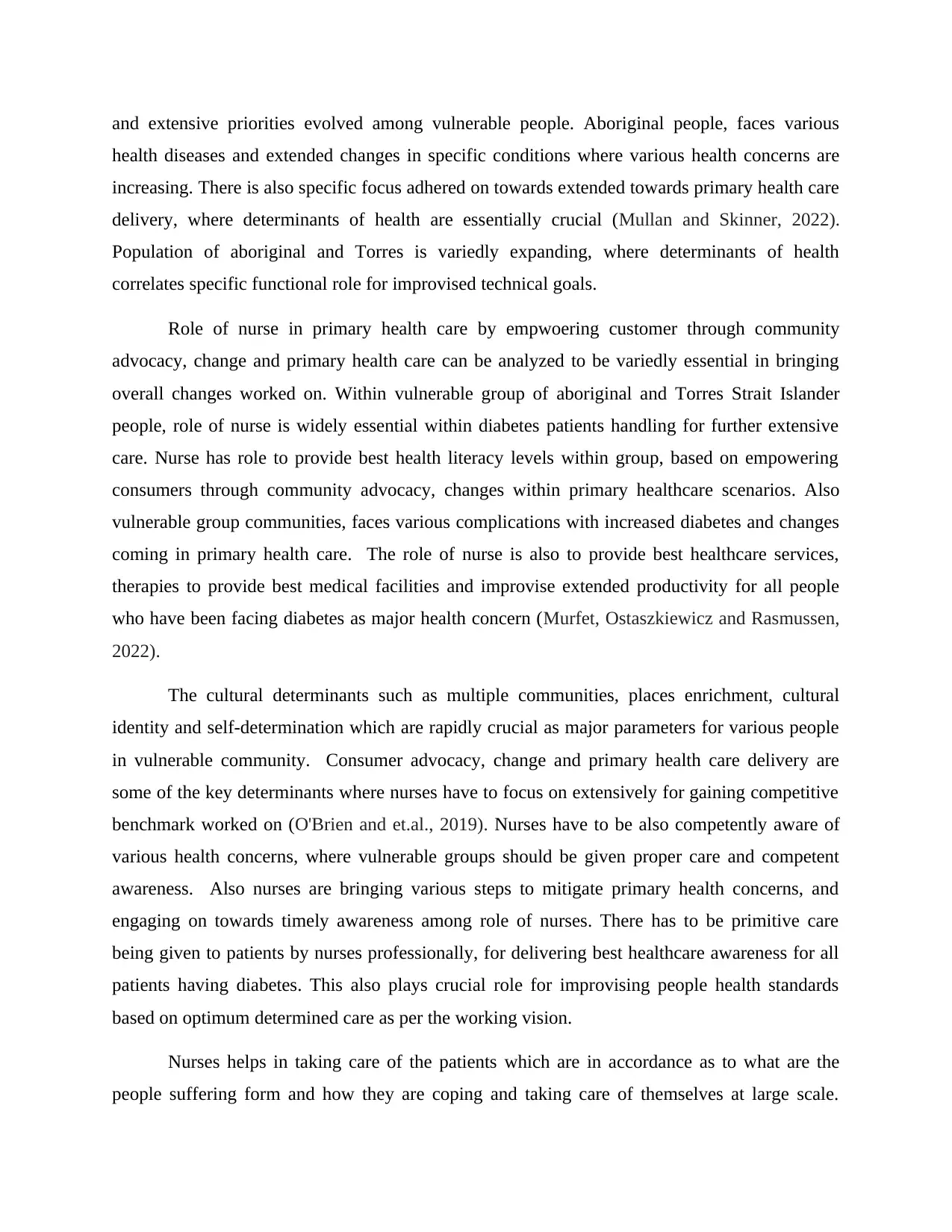
and extensive priorities evolved among vulnerable people. Aboriginal people, faces various
health diseases and extended changes in specific conditions where various health concerns are
increasing. There is also specific focus adhered on towards extended towards primary health care
delivery, where determinants of health are essentially crucial (Mullan and Skinner, 2022).
Population of aboriginal and Torres is variedly expanding, where determinants of health
correlates specific functional role for improvised technical goals.
Role of nurse in primary health care by empwoering customer through community
advocacy, change and primary health care can be analyzed to be variedly essential in bringing
overall changes worked on. Within vulnerable group of aboriginal and Torres Strait Islander
people, role of nurse is widely essential within diabetes patients handling for further extensive
care. Nurse has role to provide best health literacy levels within group, based on empowering
consumers through community advocacy, changes within primary healthcare scenarios. Also
vulnerable group communities, faces various complications with increased diabetes and changes
coming in primary health care. The role of nurse is also to provide best healthcare services,
therapies to provide best medical facilities and improvise extended productivity for all people
who have been facing diabetes as major health concern (Murfet, Ostaszkiewicz and Rasmussen,
2022).
The cultural determinants such as multiple communities, places enrichment, cultural
identity and self-determination which are rapidly crucial as major parameters for various people
in vulnerable community. Consumer advocacy, change and primary health care delivery are
some of the key determinants where nurses have to focus on extensively for gaining competitive
benchmark worked on (O'Brien and et.al., 2019). Nurses have to be also competently aware of
various health concerns, where vulnerable groups should be given proper care and competent
awareness. Also nurses are bringing various steps to mitigate primary health concerns, and
engaging on towards timely awareness among role of nurses. There has to be primitive care
being given to patients by nurses professionally, for delivering best healthcare awareness for all
patients having diabetes. This also plays crucial role for improvising people health standards
based on optimum determined care as per the working vision.
Nurses helps in taking care of the patients which are in accordance as to what are the
people suffering form and how they are coping and taking care of themselves at large scale.
health diseases and extended changes in specific conditions where various health concerns are
increasing. There is also specific focus adhered on towards extended towards primary health care
delivery, where determinants of health are essentially crucial (Mullan and Skinner, 2022).
Population of aboriginal and Torres is variedly expanding, where determinants of health
correlates specific functional role for improvised technical goals.
Role of nurse in primary health care by empwoering customer through community
advocacy, change and primary health care can be analyzed to be variedly essential in bringing
overall changes worked on. Within vulnerable group of aboriginal and Torres Strait Islander
people, role of nurse is widely essential within diabetes patients handling for further extensive
care. Nurse has role to provide best health literacy levels within group, based on empowering
consumers through community advocacy, changes within primary healthcare scenarios. Also
vulnerable group communities, faces various complications with increased diabetes and changes
coming in primary health care. The role of nurse is also to provide best healthcare services,
therapies to provide best medical facilities and improvise extended productivity for all people
who have been facing diabetes as major health concern (Murfet, Ostaszkiewicz and Rasmussen,
2022).
The cultural determinants such as multiple communities, places enrichment, cultural
identity and self-determination which are rapidly crucial as major parameters for various people
in vulnerable community. Consumer advocacy, change and primary health care delivery are
some of the key determinants where nurses have to focus on extensively for gaining competitive
benchmark worked on (O'Brien and et.al., 2019). Nurses have to be also competently aware of
various health concerns, where vulnerable groups should be given proper care and competent
awareness. Also nurses are bringing various steps to mitigate primary health concerns, and
engaging on towards timely awareness among role of nurses. There has to be primitive care
being given to patients by nurses professionally, for delivering best healthcare awareness for all
patients having diabetes. This also plays crucial role for improvising people health standards
based on optimum determined care as per the working vision.
Nurses helps in taking care of the patients which are in accordance as to what are the
people suffering form and how they are coping and taking care of themselves at large scale.
⊘ This is a preview!⊘
Do you want full access?
Subscribe today to unlock all pages.

Trusted by 1+ million students worldwide
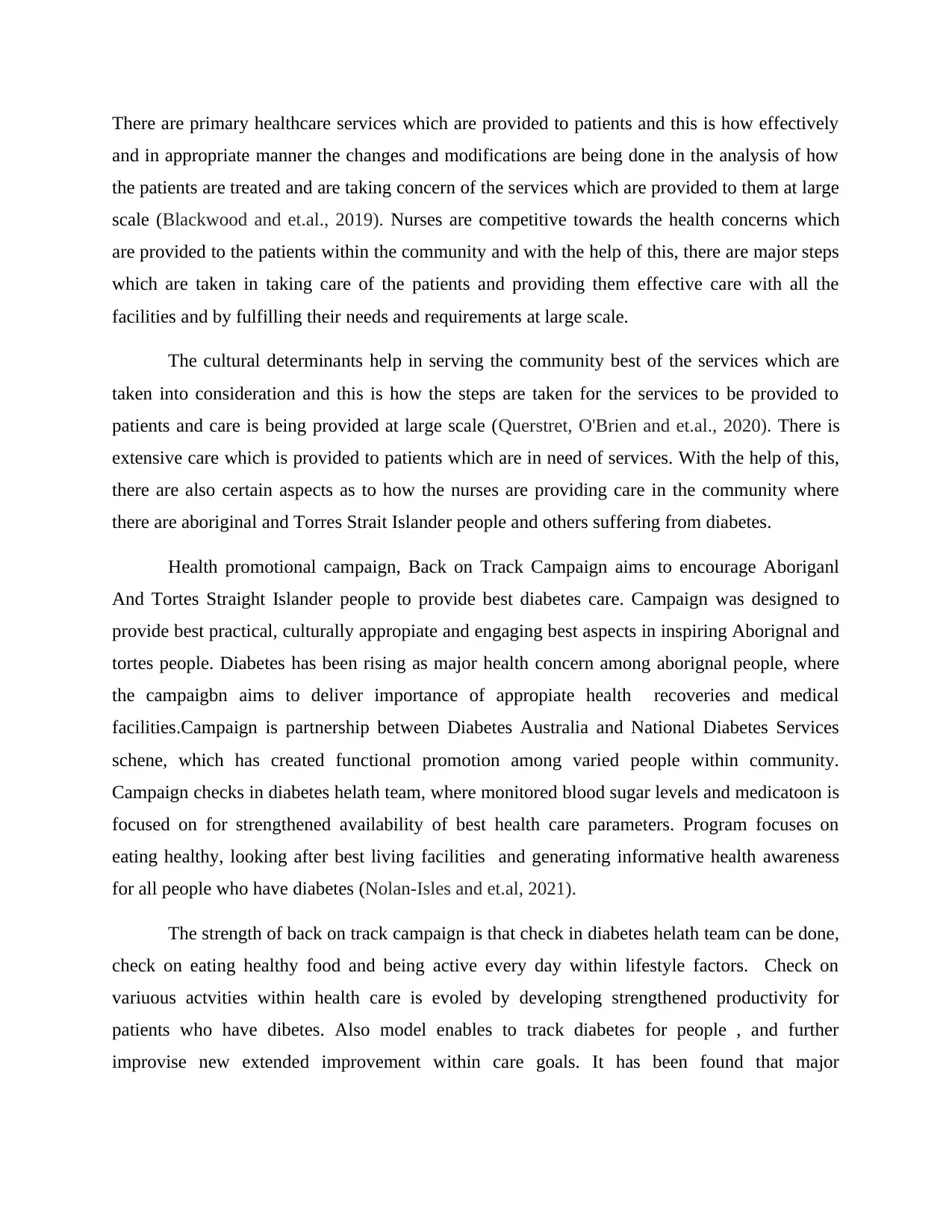
There are primary healthcare services which are provided to patients and this is how effectively
and in appropriate manner the changes and modifications are being done in the analysis of how
the patients are treated and are taking concern of the services which are provided to them at large
scale (Blackwood and et.al., 2019). Nurses are competitive towards the health concerns which
are provided to the patients within the community and with the help of this, there are major steps
which are taken in taking care of the patients and providing them effective care with all the
facilities and by fulfilling their needs and requirements at large scale.
The cultural determinants help in serving the community best of the services which are
taken into consideration and this is how the steps are taken for the services to be provided to
patients and care is being provided at large scale (Querstret, O'Brien and et.al., 2020). There is
extensive care which is provided to patients which are in need of services. With the help of this,
there are also certain aspects as to how the nurses are providing care in the community where
there are aboriginal and Torres Strait Islander people and others suffering from diabetes.
Health promotional campaign, Back on Track Campaign aims to encourage Aboriganl
And Tortes Straight Islander people to provide best diabetes care. Campaign was designed to
provide best practical, culturally appropiate and engaging best aspects in inspiring Aborignal and
tortes people. Diabetes has been rising as major health concern among aborignal people, where
the campaigbn aims to deliver importance of appropiate health recoveries and medical
facilities.Campaign is partnership between Diabetes Australia and National Diabetes Services
schene, which has created functional promotion among varied people within community.
Campaign checks in diabetes helath team, where monitored blood sugar levels and medicatoon is
focused on for strengthened availability of best health care parameters. Program focuses on
eating healthy, looking after best living facilities and generating informative health awareness
for all people who have diabetes (Nolan-Isles and et.al, 2021).
The strength of back on track campaign is that check in diabetes helath team can be done,
check on eating healthy food and being active every day within lifestyle factors. Check on
variuous actvities within health care is evoled by developing strengthened productivity for
patients who have dibetes. Also model enables to track diabetes for people , and further
improvise new extended improvement within care goals. It has been found that major
and in appropriate manner the changes and modifications are being done in the analysis of how
the patients are treated and are taking concern of the services which are provided to them at large
scale (Blackwood and et.al., 2019). Nurses are competitive towards the health concerns which
are provided to the patients within the community and with the help of this, there are major steps
which are taken in taking care of the patients and providing them effective care with all the
facilities and by fulfilling their needs and requirements at large scale.
The cultural determinants help in serving the community best of the services which are
taken into consideration and this is how the steps are taken for the services to be provided to
patients and care is being provided at large scale (Querstret, O'Brien and et.al., 2020). There is
extensive care which is provided to patients which are in need of services. With the help of this,
there are also certain aspects as to how the nurses are providing care in the community where
there are aboriginal and Torres Strait Islander people and others suffering from diabetes.
Health promotional campaign, Back on Track Campaign aims to encourage Aboriganl
And Tortes Straight Islander people to provide best diabetes care. Campaign was designed to
provide best practical, culturally appropiate and engaging best aspects in inspiring Aborignal and
tortes people. Diabetes has been rising as major health concern among aborignal people, where
the campaigbn aims to deliver importance of appropiate health recoveries and medical
facilities.Campaign is partnership between Diabetes Australia and National Diabetes Services
schene, which has created functional promotion among varied people within community.
Campaign checks in diabetes helath team, where monitored blood sugar levels and medicatoon is
focused on for strengthened availability of best health care parameters. Program focuses on
eating healthy, looking after best living facilities and generating informative health awareness
for all people who have diabetes (Nolan-Isles and et.al, 2021).
The strength of back on track campaign is that check in diabetes helath team can be done,
check on eating healthy food and being active every day within lifestyle factors. Check on
variuous actvities within health care is evoled by developing strengthened productivity for
patients who have dibetes. Also model enables to track diabetes for people , and further
improvise new extended improvement within care goals. It has been found that major
Paraphrase This Document
Need a fresh take? Get an instant paraphrase of this document with our AI Paraphraser
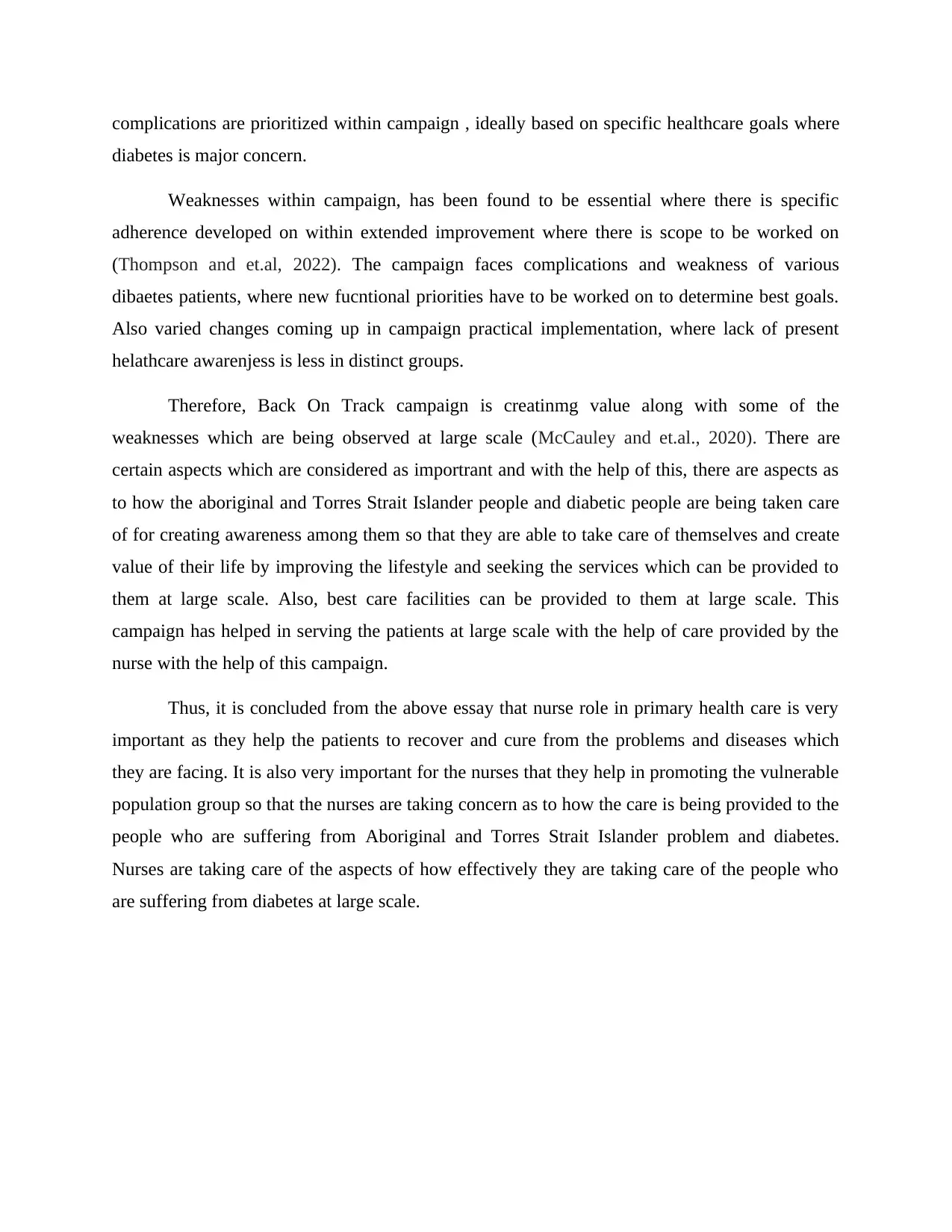
complications are prioritized within campaign , ideally based on specific healthcare goals where
diabetes is major concern.
Weaknesses within campaign, has been found to be essential where there is specific
adherence developed on within extended improvement where there is scope to be worked on
(Thompson and et.al, 2022). The campaign faces complications and weakness of various
dibaetes patients, where new fucntional priorities have to be worked on to determine best goals.
Also varied changes coming up in campaign practical implementation, where lack of present
helathcare awarenjess is less in distinct groups.
Therefore, Back On Track campaign is creatinmg value along with some of the
weaknesses which are being observed at large scale (McCauley and et.al., 2020). There are
certain aspects which are considered as importrant and with the help of this, there are aspects as
to how the aboriginal and Torres Strait Islander people and diabetic people are being taken care
of for creating awareness among them so that they are able to take care of themselves and create
value of their life by improving the lifestyle and seeking the services which can be provided to
them at large scale. Also, best care facilities can be provided to them at large scale. This
campaign has helped in serving the patients at large scale with the help of care provided by the
nurse with the help of this campaign.
Thus, it is concluded from the above essay that nurse role in primary health care is very
important as they help the patients to recover and cure from the problems and diseases which
they are facing. It is also very important for the nurses that they help in promoting the vulnerable
population group so that the nurses are taking concern as to how the care is being provided to the
people who are suffering from Aboriginal and Torres Strait Islander problem and diabetes.
Nurses are taking care of the aspects of how effectively they are taking care of the people who
are suffering from diabetes at large scale.
diabetes is major concern.
Weaknesses within campaign, has been found to be essential where there is specific
adherence developed on within extended improvement where there is scope to be worked on
(Thompson and et.al, 2022). The campaign faces complications and weakness of various
dibaetes patients, where new fucntional priorities have to be worked on to determine best goals.
Also varied changes coming up in campaign practical implementation, where lack of present
helathcare awarenjess is less in distinct groups.
Therefore, Back On Track campaign is creatinmg value along with some of the
weaknesses which are being observed at large scale (McCauley and et.al., 2020). There are
certain aspects which are considered as importrant and with the help of this, there are aspects as
to how the aboriginal and Torres Strait Islander people and diabetic people are being taken care
of for creating awareness among them so that they are able to take care of themselves and create
value of their life by improving the lifestyle and seeking the services which can be provided to
them at large scale. Also, best care facilities can be provided to them at large scale. This
campaign has helped in serving the patients at large scale with the help of care provided by the
nurse with the help of this campaign.
Thus, it is concluded from the above essay that nurse role in primary health care is very
important as they help the patients to recover and cure from the problems and diseases which
they are facing. It is also very important for the nurses that they help in promoting the vulnerable
population group so that the nurses are taking concern as to how the care is being provided to the
people who are suffering from Aboriginal and Torres Strait Islander problem and diabetes.
Nurses are taking care of the aspects of how effectively they are taking care of the people who
are suffering from diabetes at large scale.
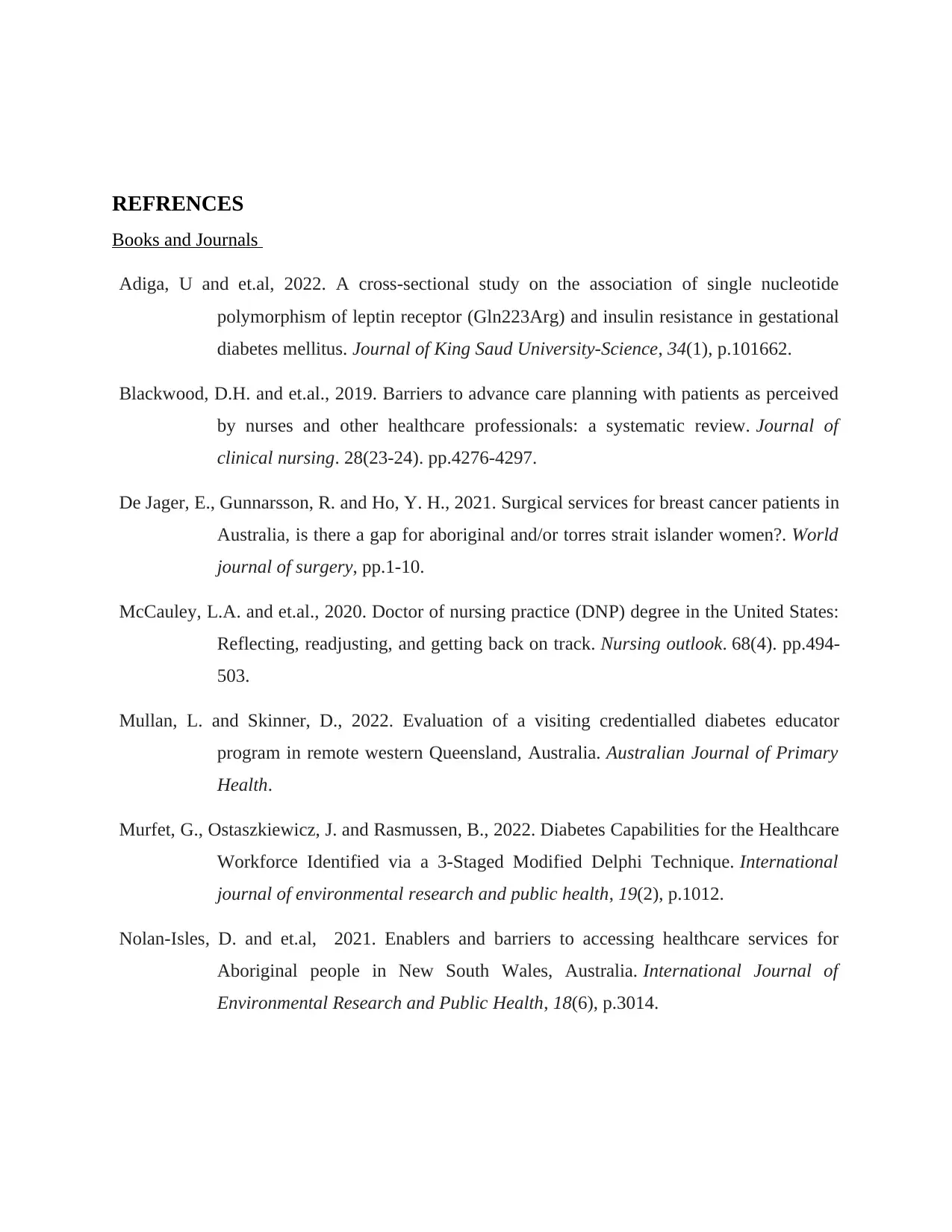
REFRENCES
Books and Journals
Adiga, U and et.al, 2022. A cross-sectional study on the association of single nucleotide
polymorphism of leptin receptor (Gln223Arg) and insulin resistance in gestational
diabetes mellitus. Journal of King Saud University-Science, 34(1), p.101662.
Blackwood, D.H. and et.al., 2019. Barriers to advance care planning with patients as perceived
by nurses and other healthcare professionals: a systematic review. Journal of
clinical nursing. 28(23-24). pp.4276-4297.
De Jager, E., Gunnarsson, R. and Ho, Y. H., 2021. Surgical services for breast cancer patients in
Australia, is there a gap for aboriginal and/or torres strait islander women?. World
journal of surgery, pp.1-10.
McCauley, L.A. and et.al., 2020. Doctor of nursing practice (DNP) degree in the United States:
Reflecting, readjusting, and getting back on track. Nursing outlook. 68(4). pp.494-
503.
Mullan, L. and Skinner, D., 2022. Evaluation of a visiting credentialled diabetes educator
program in remote western Queensland, Australia. Australian Journal of Primary
Health.
Murfet, G., Ostaszkiewicz, J. and Rasmussen, B., 2022. Diabetes Capabilities for the Healthcare
Workforce Identified via a 3-Staged Modified Delphi Technique. International
journal of environmental research and public health, 19(2), p.1012.
Nolan-Isles, D. and et.al, 2021. Enablers and barriers to accessing healthcare services for
Aboriginal people in New South Wales, Australia. International Journal of
Environmental Research and Public Health, 18(6), p.3014.
Books and Journals
Adiga, U and et.al, 2022. A cross-sectional study on the association of single nucleotide
polymorphism of leptin receptor (Gln223Arg) and insulin resistance in gestational
diabetes mellitus. Journal of King Saud University-Science, 34(1), p.101662.
Blackwood, D.H. and et.al., 2019. Barriers to advance care planning with patients as perceived
by nurses and other healthcare professionals: a systematic review. Journal of
clinical nursing. 28(23-24). pp.4276-4297.
De Jager, E., Gunnarsson, R. and Ho, Y. H., 2021. Surgical services for breast cancer patients in
Australia, is there a gap for aboriginal and/or torres strait islander women?. World
journal of surgery, pp.1-10.
McCauley, L.A. and et.al., 2020. Doctor of nursing practice (DNP) degree in the United States:
Reflecting, readjusting, and getting back on track. Nursing outlook. 68(4). pp.494-
503.
Mullan, L. and Skinner, D., 2022. Evaluation of a visiting credentialled diabetes educator
program in remote western Queensland, Australia. Australian Journal of Primary
Health.
Murfet, G., Ostaszkiewicz, J. and Rasmussen, B., 2022. Diabetes Capabilities for the Healthcare
Workforce Identified via a 3-Staged Modified Delphi Technique. International
journal of environmental research and public health, 19(2), p.1012.
Nolan-Isles, D. and et.al, 2021. Enablers and barriers to accessing healthcare services for
Aboriginal people in New South Wales, Australia. International Journal of
Environmental Research and Public Health, 18(6), p.3014.
⊘ This is a preview!⊘
Do you want full access?
Subscribe today to unlock all pages.

Trusted by 1+ million students worldwide
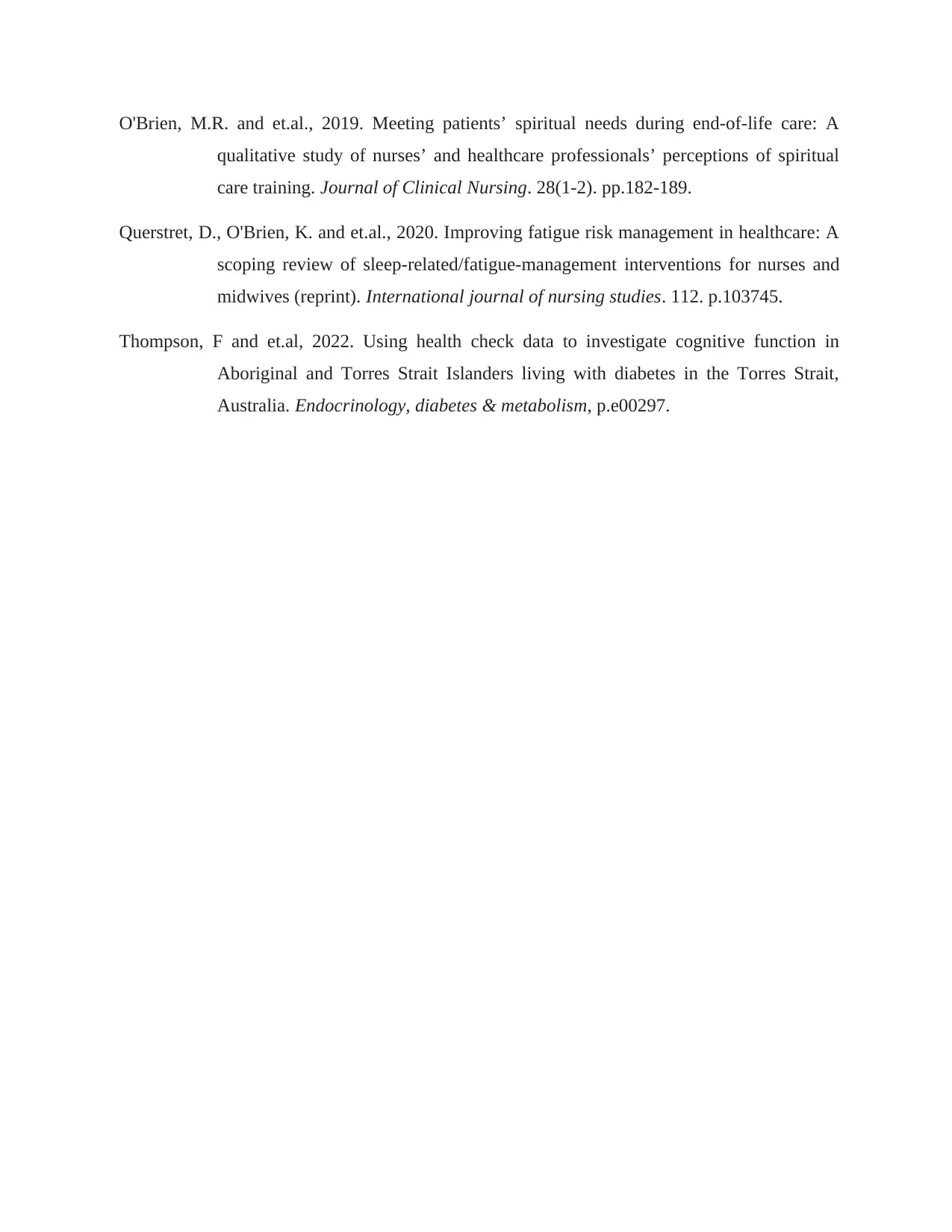
O'Brien, M.R. and et.al., 2019. Meeting patients’ spiritual needs during end‐of‐life care: A
qualitative study of nurses’ and healthcare professionals’ perceptions of spiritual
care training. Journal of Clinical Nursing. 28(1-2). pp.182-189.
Querstret, D., O'Brien, K. and et.al., 2020. Improving fatigue risk management in healthcare: A
scoping review of sleep-related/fatigue-management interventions for nurses and
midwives (reprint). International journal of nursing studies. 112. p.103745.
Thompson, F and et.al, 2022. Using health check data to investigate cognitive function in
Aboriginal and Torres Strait Islanders living with diabetes in the Torres Strait,
Australia. Endocrinology, diabetes & metabolism, p.e00297.
qualitative study of nurses’ and healthcare professionals’ perceptions of spiritual
care training. Journal of Clinical Nursing. 28(1-2). pp.182-189.
Querstret, D., O'Brien, K. and et.al., 2020. Improving fatigue risk management in healthcare: A
scoping review of sleep-related/fatigue-management interventions for nurses and
midwives (reprint). International journal of nursing studies. 112. p.103745.
Thompson, F and et.al, 2022. Using health check data to investigate cognitive function in
Aboriginal and Torres Strait Islanders living with diabetes in the Torres Strait,
Australia. Endocrinology, diabetes & metabolism, p.e00297.
1 out of 7
Related Documents
Your All-in-One AI-Powered Toolkit for Academic Success.
+13062052269
info@desklib.com
Available 24*7 on WhatsApp / Email
![[object Object]](/_next/static/media/star-bottom.7253800d.svg)
Unlock your academic potential
Copyright © 2020–2026 A2Z Services. All Rights Reserved. Developed and managed by ZUCOL.





